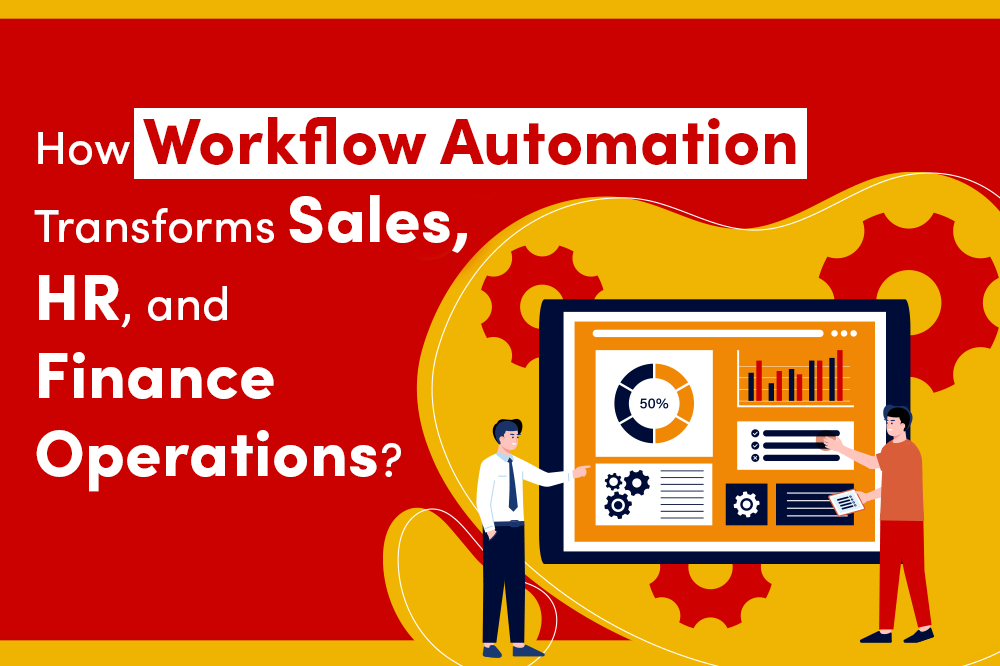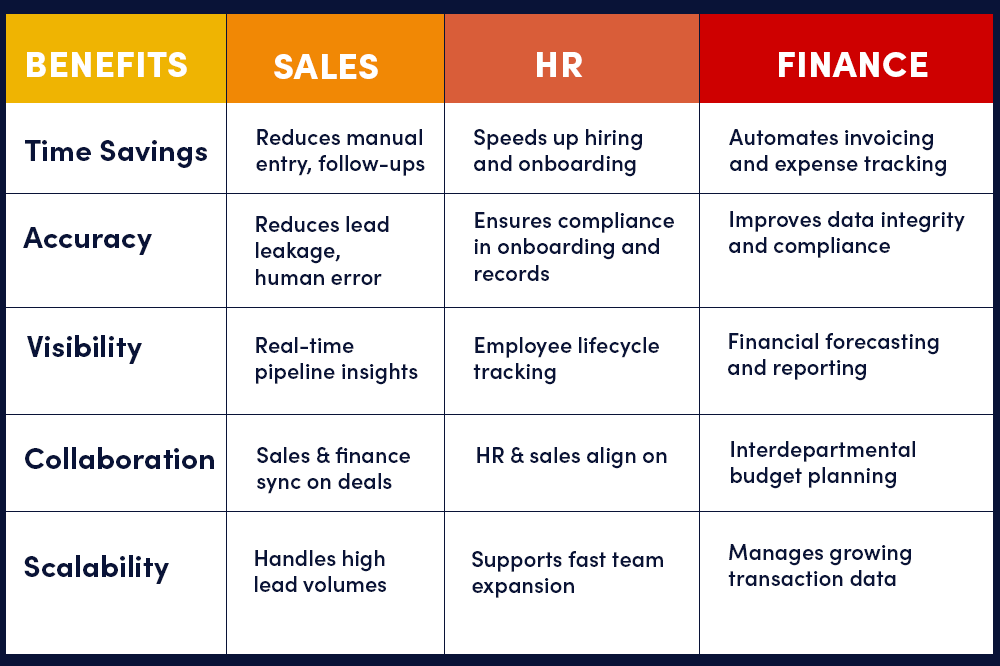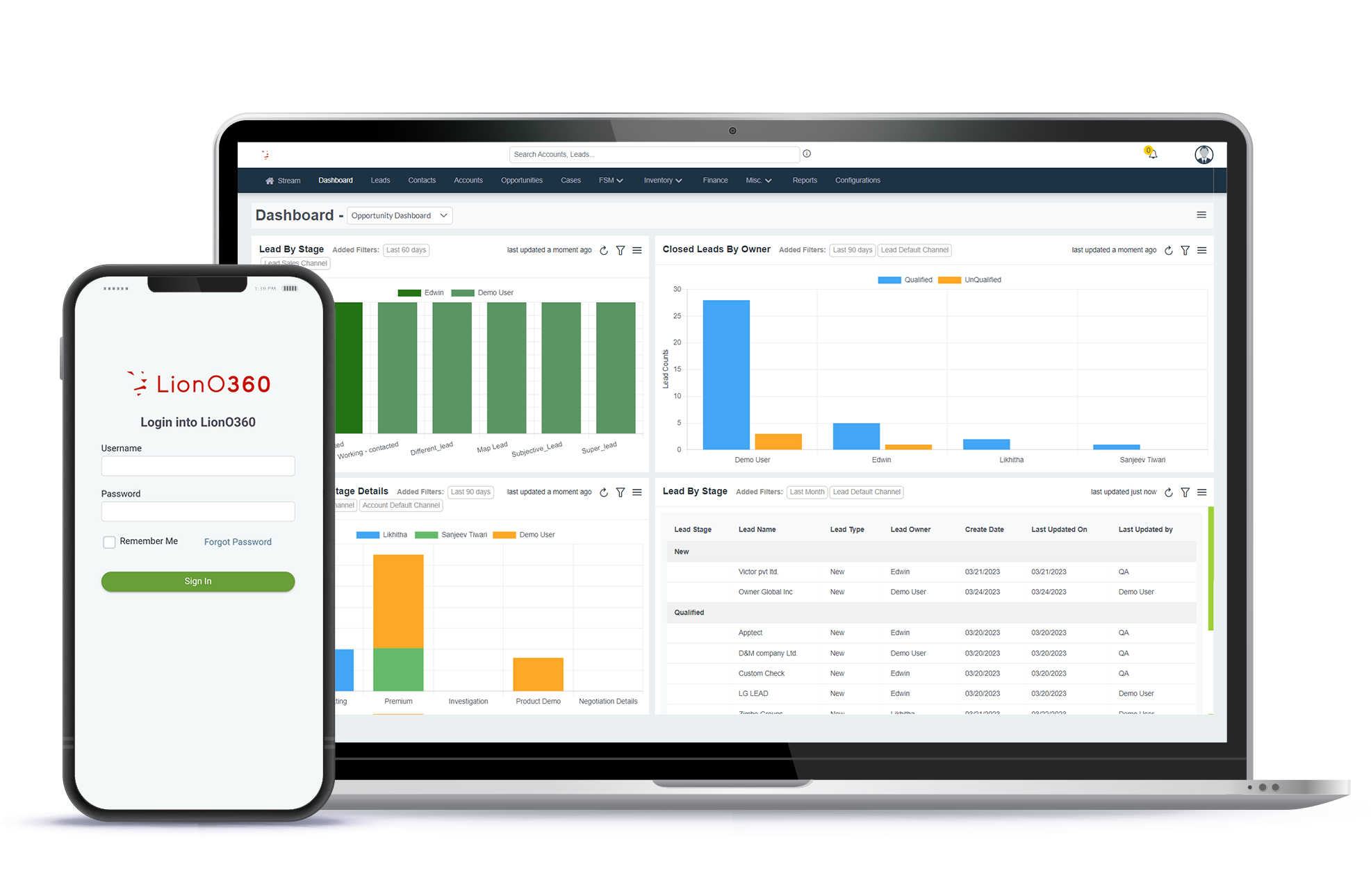
The competitive landscape in today’s business, agility and efficiency are key to staying ahead. With rapid digital transformation across industries, companies are increasingly turning to Customer Relationship Management (CRM) systems with workflow automation to streamline operations. While traditionally associated with sales and customer service, modern CRM platforms have evolved into powerful tools that also optimize HR and finance functions.
So how exactly does CRM workflow automation revolutionize the way sales, HR, and finance teams work? Let’s explore this transformation in depth.
What is CRM Workflow Automation?
Before diving into its cross-functional impact, it's important to understand what CRM workflow automation entails.
Automated CRM workflows refer to the use of predefined rules, triggers, and actions to automate repetitive tasks and processes within a CRM system. Instead of relying on manual inputs, the system automatically performs actions based on user behavior, data updates, or time-based triggers.
For example:
- Sending a follow-up email when a lead fills out a form within CRM in sales operations.
- Creating a task for HR when a new employee is added.
- Generating monthly expense reports for finance teams.
These automations not only reduce manual errors but also save time, ensure consistency, and boost productivity.
Workflow Automation in Sales, HR & Finance
Let’s start with the light on CRM automation benefits across teams:

Let’s discuss that how a workflow automation by CRM enhances work process in Sales, HR and Finance departments:
1. Sales: Accelerating Lead Management and Conversion
Sales teams are under constant pressure to meet targets, respond to leads quickly, and personalize interactions. CRM workflow automation plays a crucial role here by removing friction from the sales cycle.
Lead Capture and Qualification
Automated workflows in lead management can:
- Capture leads from websites, social media, and landing pages in real-time.
- Automatically assign scores based on engagement, source, or demographic.
- Route qualified leads to the right salesperson or team.
- Ensure top leads aren’t missed and are acted upon immediately.
Follow-Ups and Reminders
Sales reps often juggle multiple deals at once. Automation can:
- Send follow-up emails at preset intervals.
- Remind reps to call leads who haven’t responded.
- Notify managers of deals that are stagnating.
These small nudges can significantly improve conversion rates.
Sales Pipeline Management
Workflows can move deals through the sales forecasting based on activity. For example:
- When a prospect replies positively, the system moves the deal to the “Negotiation” stage.
- If there’s no interaction for days, it notifies the deal for review.
This dynamic tracking ensures accurate forecasting and better visibility.
2. HR: Streamlining Recruitment, Onboarding, and Employee Engagement
Modern HR is more than just hiring and payroll. It’s about creating great employee experiences—and CRM automation helps make that happen efficiently.
Recruitment Automation
From screening to interview scheduling, CRM for HR processes can:
- Parse resumes and match candidates to job descriptions.
- Notify recruiters when high-potential resumes are submitted.
- Schedule interviews automatically based on calendar availability.
This shortens the hiring cycle and ensures better candidate experience.
Seamless Onboarding
Once a candidate is hired, workflows trigger onboarding sequences like:
- Sending welcome emails and documents.
- Creating IT and HR tickets for access setup.
- Reminding managers about probation reviews.
This ensures no step is missed and new hires feel supported from day one.
Employee Lifecycle Management
HR workflows can manage everything from promotions to exit formalities:
- Automated performance review reminders.
- Track training and development milestones.
- Send feedback forms at key employee milestones.
With CRM automation, HR teams can focus on strategy instead of chasing paperwork.
3. Finance: Enabling Accurate, Timely, and Transparent Operations
Finance teams often deal with sensitive data and time-bound processes. CRM in finance automation reduces manual interventions while improving compliance and visibility.
Invoice and Payment Tracking
Finance CRMs can:
- Generate invoices automatically once a deal is marked closed.
- Send payment reminders based on due dates.
- Flag overdue accounts for follow-up.
This not only improves cash flow but also strengthens client relationships.
Expense Management
Automated workflows can:
- Route expense claims for approval based on predefined policies.
- Flag policy violations or duplicate submissions.
- Trigger reimbursement processes once approvals are in place.
Employees get quicker reimbursements, and finance gains real-time tracking.
Budgeting and Forecasting
CRM systems integrated with financial tools can:
- Provide dashboards that auto-update with sales and expense data.
- Trigger alerts when budgets are exceeded.
- Generate reports for quarterly and annual planning.
This supports data-driven decision-making across departments.
Workflow Automation with LionO360 CRM: Speed Up Your Workflow

LionO360 Cloud CRM empowers you to accelerate operations across departments with intelligent workflow automation. From sales and customer service to HR, finance, and inventory, LionOBytes helps you eliminate repetitive tasks, reduce human error, and ensure nothing falls through the cracks.
With LionO360’s automation capabilities, you can:
- Automatically assign leads, follow-up tasks, and pipeline stages in sales.
- Streamline employee onboarding and performance review cycles in HR.
- Trigger invoice generation, expense approvals, and payment reminders in finance.
- Set inventory alerts and automate restock actions in supply chain management.
Every action is triggered based on real-time data, user behavior, or time-based rules—so your team can focus on strategic goals, not manual processes.
Speed up your workflow, boost accuracy, and stay ahead of the competition with LionO360’s powerful Free CRM demo. Contact us now @+1 609-281-5272
Frequently Asked Questions
What is CRM workflow automation, and how does it benefit businesses?
CRM workflow automation refers to the use of rules, triggers, and scheduled actions within a CRM system to automate routine tasks. It benefits businesses by improving efficiency, reducing manual errors, ensuring consistent processes, and freeing up teams to focus on high-value work like customer engagement, strategy, and decision-making.
How does CRM automate tasks across different departments like sales, HR, and finance?
A CRM offers cross-functional workflow automation that connects processes across departments:
- In sales, it automates lead assignment, follow-ups, and pipeline progression.
- In HR, it manages recruitment, onboarding, and employee lifecycle workflows.
- In finance, it automated invoice generation, expense approvals, and payment tracking.
Is workflow automation useful for financial operations and compliance?
Absolutely. CRM workflow automation helps finance teams by streamlining tasks like invoice generation, payment reminders, approval routing for expenses, and budget monitoring. It enhances accuracy, ensures compliance with internal policies, and supports timely reporting and financial forecasting.
Why should growing businesses consider using LionO360 for workflow automation?
Growing businesses often struggle with process bottlenecks and data silos. LionO360 offers an all-in-one CRM with automation capabilities tailored for scaling operations. It reduces manual workload, enhances interdepartmental coordination, and enables companies to handle increasing workloads without proportionally increasing headcount.












